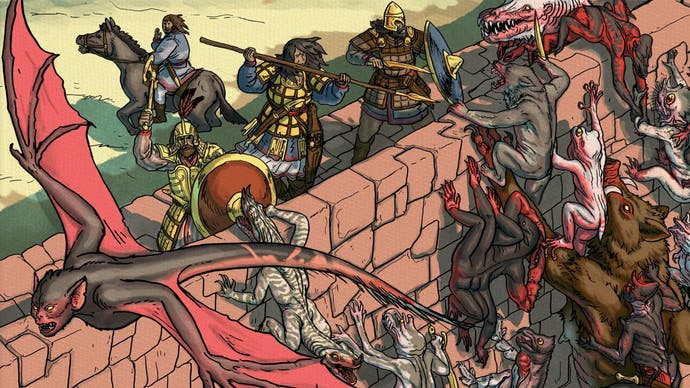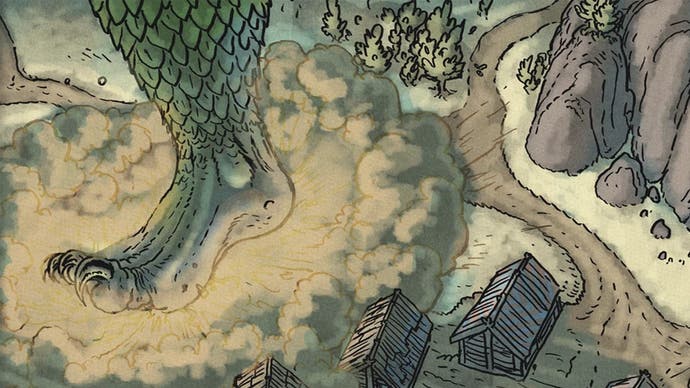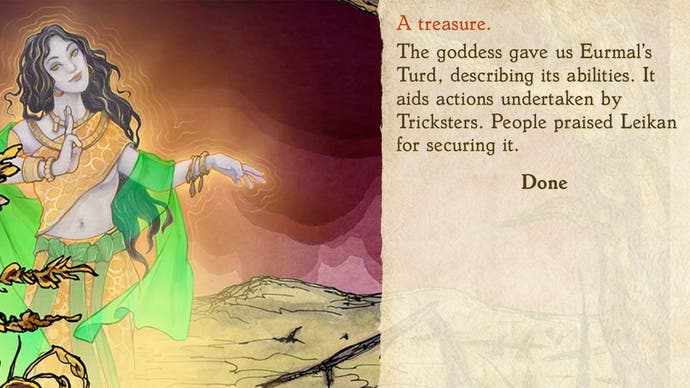A brutal story RPG beat the save scumming out of me
Barbarian immersion therapy.
It had been a tough couple of rounds for my clan of doomed horse Vikings. The world-shattering war between the gods and chaos now blotted out the sun. The heroes questing for the royal regalia were missing, presumed eaten by druids. All of our goats had gone insane. At least I had sacrificed enough to send my God Talkers on a divine petition to maybe, just maybe, persuade them to prevent another famine. Then a random event informed me that the devil Wakboth World Ruin had just sucker punched our elder god of language out of the sky -- wiping out them along with my biggest ally (whom they landed on) and the literal concept of words.
I was, to quote my senior priest, "ivivm frrrrrl screwed." But something hit me even harder than Wakboth's gross serpent fist: at no point during this cursed streak of bad luck had I felt that familiar compulsion to start over.
Do you, like me, suffer from save scum-itis? Is your finger worn to a stump from smashing the F9 key every time you miss a 95 percent chance shot? Do you Groundhog Day your way through every dialog tree outcome until the loading screen tooltips are burned onto your retinas? Then Six Ages 2: Lights Going Out might be the cure. In this choose-your-own-Ragnarok strategy RPG, you lead a tribe of Bronze Age barbarians through an ancient world of myth, magic, and making sure you have more cattle than your neighbours. But unlike its predecessor, Six Ages: Ride Like The Wind, or its ancient ancestor, 1999's King of Dragon Pass, you won't be spending your time in Glorantha honour raiding the chariot-people or seducing river dragons. Instead, you're in a desperate struggle for survival, as the world is dying and your gods have abandoned you.

And that includes the god of RNG. While most of what happens in Lights Going Out is determined by a roll of the die, fortune favours you as often as you'd expect for someone whose doom has been prophesied on ancient stone tablets. Before long, your clan management screen will be flashing more emergency icons than the dashboard of a second-hand Fiat Punto. Meanwhile, you'll grow to fear the series' iconic random events, whose once enchanting storybook pages now continuously plunge you into Boschian hellscapes.

For a degenerate save scummer like myself, brute forcing the odds on my side tends to be simply a test of endurance. But here it's that test you have in a nightmare where you didn't study, someone stole your pants and then a devil eats your soul. This is the type of lore-first game that hides away your stats, modifiers or even success chances, making trial-and-error runs almost pointless. The closest thing you get is the advice from your tribal council of advisors. But to make matters yet more chaotic, even your sage HUD wasn't clued in on how to deal with a lot of random calamities either, and often have nothing to add except mutter how the old scrolls didn't mention anything about octopus vampires stealing your children.
Woefully, their panicked ramblings are still more useful than looking for any advantage outside of the game. Old Six Ages strategy guides and help pages are about as useful for navigating this mad new world as consulting a Victorian farmer's almanac for growing potatoes on Venus. And try to scrounge tips in the Lights Going Out discussion boards and all you'll find are veteran players huddled together like superstitious serfs, swapping conspiracies about how they can't finish this or that fetch quest -- not because of bad luck but because it's a chaos devil trap to drain your limited resources (and sanity) on a wild goose chase.
A game where you spend a lot of time stumbling in the dark getting ambushed by a nigh-invincible enemy sounds unfair. And it is. But the real genius of Lights Going Out lies in how it makes endlessly, unsportingly getting your ass kicked feel neither frustrating or punishing. This is in part thanks to some surprisingly forgiving gameplay mechanics. In other strategy RPGs it'd be a massive deathblow were to you lose half of your population to an abyssal asthma attack or see your god of pastures get ganked in year one, leaving you defenceless when a devil named Brolgar Ram-Cosplayer starts turning your sheep against you. But this isn't the case in Lights Going Out, where taking a body blow every three rounds will quickly teach you there's little your tribe can't endure with some can-do attitude and an overworked Labrador spirit.
But the world building does the heavy lifting when it comes to keeping the pressure off. The ancient peoples of Glorantha have long accepted that life is as brittle as their bronze swords, and they're always one divine temper tantrum away from being wiped out. There's little gloom to go with all that doom. So what if you couldn't stop that gigantic death worm from popping out of their burial mound, vomiting ancestral bones all over their rune of manhood and reverting their warriors into preteens? That's just a Thor's Day around here, buddy.

Slowly but surely, like water torture, this Beowulfian blasé attitude trickled into my approach to the game. With the end of the world guaranteed in *checks calendar* exactly twenty-six seasons, is it really so bad that you got a bunch of your barbarians' tickets to Valhalla punched early? Even if you wind up with a total population kill, that won't punish you with a game over. Instead, it fast-forwards you to the endgame. Congratulations? I once pulled off a 10-minute speed run by accident when a random encounter let me poke a chaos god in the eye in a glorious moment of, "What are you going to do, crush my entire civilisation under your foot?"

Any game can teach you how to play it mechanically, but a great game will teach you how to play it thematically. (A bad game will teach you how to crouch in a 40-minute long unskippable tutorial). And veteran tabletop RPG creators, David Dunham and Robin Laws, really put their decades of dice-rolling expertise on show when they developed Lights Going Out. As a 'tabletop-like' video game, it is a masterclass in encouraging a playstyle where you stop trying to dodge and instead roll with it. Baldur's Gate 3, another great example of TTRPG conditioning, achieved this by leaning into the exhilarating chaos of RNG misfortune, making you almost wish you'll crit fail that persuasion check in the middle of a fireworks factory just to see what wacky hijinks will ensue.
Lights Going Out has the same approach, except that its flavour of chaos will have demons spike your crops with worms that crawl into everyone's brains and curse them with the knowledge of how and when they will die. And it does the same to you. Because its theme isn't that this apocalypse is punishingly brutal -- it's merely fatal. That's in the old definition of the word where your mortal ass is forever subject to the whims of fate. You can't beat fate. Fate beats you. Then it kicks you in the ribs, steals your wallet and whispers all the mean gossip people are saying behind your back. And counter to all my instincts it made me want to keep crawling forward and mumble, "That all you got?"
It turns out that this lesson counted double towards my reload reflex. After all, saves cumming is about that frustration when the video game power fantasy breaks and you no longer feel in control, whether it's because you just got robbed of a shot at killing the enemy boss or at romancing that cute wizard companion because of one poorly worded dialog choice. But by dunking my head into the toilet bowl of inevitability over and over again, Lights Going Out not only took away this frustration but gave me a new power fantasy: to stop second-guessing myself.
When a potential ally asked me the standard barbarian interview question of what is best in life, I stood my suboptimal ground and chose to reply with "hope." That promptly got me laughed out of their yurt with a 'raid me' sign taped to my back. However, then the goddess of healing appeared in a vision and rewarded me with a random divine artefact for being such a sweet boy. It was an actual box of s**t.

And I counted it as an absolute win. The more I stuck to my guns no matter the consequences, the more I felt I was nailing every cursed trolley problem the game threw at me. If I had stuck to my stubborn ways I likely would have rage-quit Lights Going Out the moment I saw one of those trolleys looping back to try and pick up its spare. Instead, this fatal RPG taught me to let go and embrace chaos.
(Some of the time. I still save scum when trolls raid me three seasons in a row because frrrrl that.)
